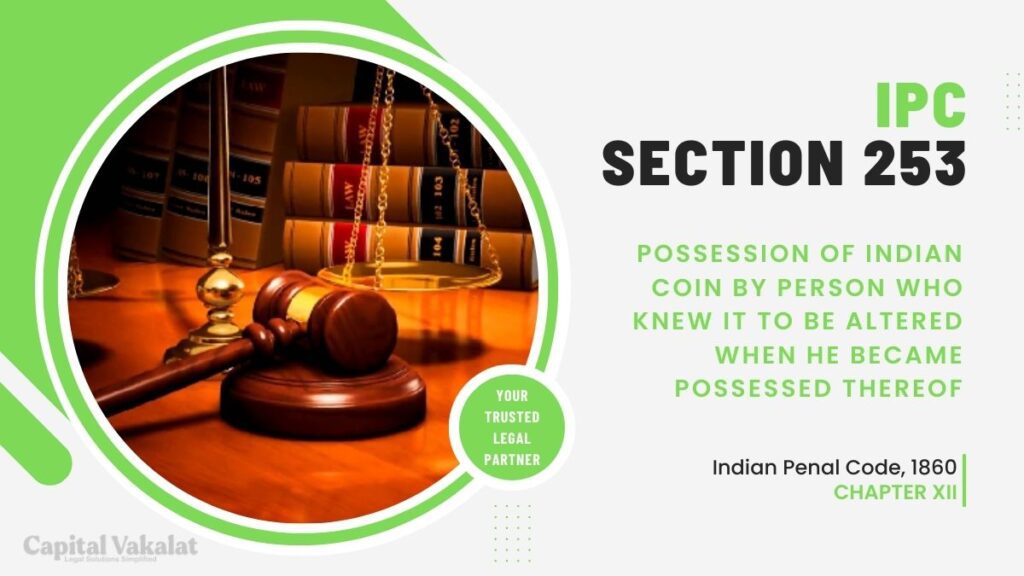In India, the possession of altered Indian coins is a matter governed by the Indian Penal Code (IPC), specifically under Section 253. This section addresses individuals who knowingly possess Indian coins that have been altered.

Understanding the intricacies of this law is crucial, as it not only pertains to the legality of coin alteration but also has broader implications for the economy and society.
Introduction
Possessing Indian coins that have been altered when the possessor knew of the alteration is a legal offense in India. Section 253 of the IPC seeks to address the issue of altered coins, emphasizing the need for individuals to be aware of the altered nature of the currency in their possession. This article explores the various facets of Section 253 IPC, delving into its implications and historical context.
Understanding Section 253 IPC
Section 253 IPC is a part of the Indian Penal Code, which was enacted in 1860. This section specifically addresses the possession of Indian coins that have been altered when the possessor knew about the alteration at the time of acquiring them. The primary purpose of this law is to deter individuals from knowingly handling altered currency, thereby safeguarding the integrity of the monetary system.
The Concept of Coin Alteration
Before delving into the legal aspects of Section 253 IPC, it’s essential to understand what constitutes coin alteration. Coin alteration refers to the act of modifying or tampering with the physical characteristics of a coin to change its value, appearance, or composition. This can involve actions like shaving, counterfeiting, or melting down coins to create counterfeit currency.
Knowledge of Alteration
One critical element of Section 253 IPC is the requirement of knowledge on the part of the possessor. In other words, if a person possesses an Indian coin that has been altered and was aware of this alteration at the time of obtaining the coin, they can be held liable under this section. This brings intent and awareness into the legal equation.
Historical Context
The need for a legal provision like Section 253 IPC can be traced back to historical instances of coin alteration in India. Over the centuries, India has witnessed various forms of coin tampering, including the clipping of edges and the use of substandard materials to create counterfeit coins. Notable cases in Indian history highlight the importance of regulating coin alteration.
Prosecution and Defenses
When an individual is charged under Section 253 IPC, they may face legal consequences. The prosecution must establish that the person knowingly possessed the altered coin at the time of acquisition. However, there are defenses available to the accused, such as lack of knowledge regarding the alteration, which can be used to challenge the charges.
Penalties and Punishments
Violating Section 253 IPC can lead to legal penalties. The specific penalties and punishments may vary, but they typically include fines or imprisonment. To further understand the implications, it’s essential to consider related sections of the IPC, which deal with counterfeiting and related offenses.
Impact on the Economy
Coin alteration, whether through counterfeiting or other means, has a significant impact on the economy. It can erode trust in the monetary system, devalue currency, and potentially lead to inflation. Understanding the consequences of altered coins on the broader economy underscores the importance of Section 253 IPC.
Preventing Coin Alteration
Preventing coin alteration requires a concerted effort by regulatory authorities, financial institutions, and the public. Measures like coin security features and public awareness campaigns can play a crucial role in deterring coin alteration. Compliance with Section 253 IPC can also contribute to maintaining the integrity of the currency.
Conclusion
In conclusion, Section 253 IPC is a vital provision within the Indian Penal Code that aims to deter the possession of Indian coins that have been knowingly altered. This law not only holds individuals accountable for their actions but also safeguards the nation’s monetary system. Upholding the integrity of Indian currency is essential for maintaining a stable and trustworthy economy.
Frequently Asked Questions
How can one prove lack of knowledge regarding coin alteration in a legal defense?
To prove lack of knowledge, one may need to provide evidence or demonstrate that they had no awareness of the coin’s alteration at the time of possession.
What measures can be taken to prevent coin alteration in India?
Preventing coin alteration involves implementing security features on currency, conducting public awareness campaigns, and enforcing Section 253 IPC.
What historical cases in India are significant in the context of coin alteration?
Historical cases like the “Clipping of Edges” in the British colonial period and other instances of counterfeit currency are significant in the context of coin alteration in India.
How does coin alteration affect the average citizen in India?
Coin alteration can lead to a devaluation of currency, which can impact the purchasing power and financial stability of the average citizen.